|
Report from
Europe
EU27 tropical wood imports below historically low pre-
COVID level
In 2023, the EU27 imported 1.59 million tonnes of tropical
wood and wood furniture products with a total value of
US$3.18 billion, respectively 18% and 27% less than the
previous year. This marked a return to the historically low
pre-pandemic level. EU27 import value of tropical wood
and wood furniture products last year was only slightly
above the annual average of US$3.06 billion during the
pre-COVID 2013 to 2019 period.
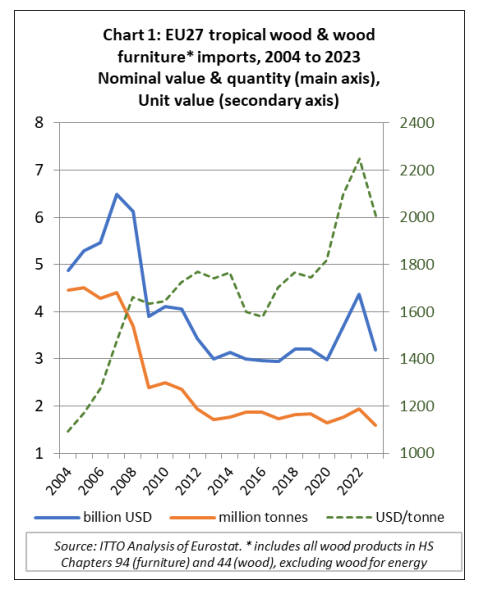
When account is taken of inflation, import value last year
was about 10% below the pre-COVID level. Import
quantity in 2023 was around 12% below the annual
average of 1.8 million tonnes during the 2013 to 2019
period.
The sharp rise in unit prices for tropical wood and wood
furniture imported into the EU that occurred during the
pandemic was also partially reversed last year.
The average price per tonne of all EU27 tropical wood and
wood furniture imports fell from a record high of
US$2250 in 2022 to US$2000 in 2023 (Chart 1 above).
In reviewing EU27 tropical imports during 2023, it is
notable that the decline in trade was almost universal,
impacting on all product groups and all supply countries
almost without exception. A downturn in which all
products and suppliers are losers is a rare event indeed and
is another indication of the sheer scale of the shift in trade
last year.
Precipitous fall in EU27 trade in the fourth quarter of
2023
The EU27 imported tropical wood and wood furniture
with total value of US$681 million in the fourth quarter of
2023, 11% less than the previous quarter and 23% down
on the same quarter the previous year.
Quarterly import value fell precipitously from a historical
high of US$1274 in the second quarter of 2022 at the peak
of the post-COVID boom (Chart 2a).
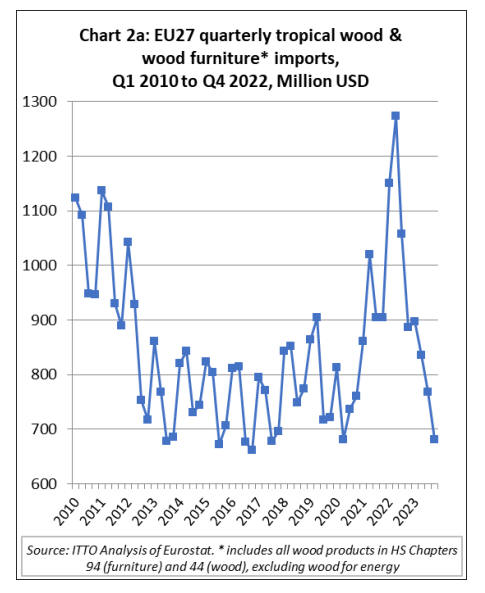
In quantity terms, total EU27 imports of tropical wood and
wood furniture of 347,000 tonnes in the fourth quarter last
year were 13% down compared to the previous quarter and
16% less than during the same quarter the previous year.
In fact, this was by far the lowest quarterly import quantity
recorded this century by the EU and quite possibly ever
recorded by the EU since it was first formed (as the EEC)
in 1957 (Chart 2b).
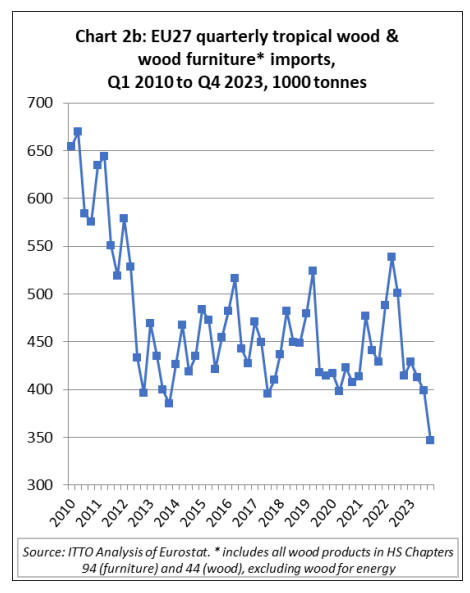
EU economic expansion comes to an abrupt end in
2023
The challenges facing the European economy are
highlighted in EU’s Winter 2024 Economic Forecast
published on 15 February. This indicates that GDP
expanded by only 0.5% in both the EU and the euro area
during 2023. Growth of only 0.9% is now projected in the
EU and 0.8% in the euro area in 2024.
According to the EU Forecast: “Last year’s modest growth
largely owes itself to the momentum of the post-pandemic
economic rebound in the previous two years.
Already towards the end of 2022, the economic expansion
came to an abrupt end and activity has since been broadly
stagnating, against the background of falling household
purchasing power, collapsing external demand, forceful
monetary tightening and the partial withdrawal of fiscal
support in 2023.
The EU economy thus entered 2024 on a weaker footing
than previously expected. After narrowly avoiding a
technical recession in the second half of last year,
prospects for the first quarter of 2024 remain subdued”.
The EU Forecast identifies some positive developments in
the EU economy, particularly in relation to inflation, since
the previous 2023 Autumn Forecast. It notes that “As
energy supply keeps outstripping demand, spot and future
prices for oil and especially gas are now significantly
lower than assumed in the Autumn Forecast.
Retail energy prices are therefore set to fall further,
helping EU recover some of the competitiveness lost
during the energy crisis. Despite mild upward pressure
from higher shipping costs in the wake of Red Sea trade
disruptions, underlying inflation continues on a steady
downward path”.
Overall, the EU Forecast suggests that “the conditions for
a gradual acceleration of economic activity this year
appear to be still in place. As inflation decelerates, real
wage growth and resilient employment should support a
rebound in consumption.
Despite falling profit margins, investment is set to benefit
from a gradual easing of credit conditions and further
deployment of the Recovery and Resilience Facility
(RRF). The pace of growth is set to stabilise broadly in
line with potential, as of the second half of this year”.
On the other hand, the EU Forecast notes that “protracted
geopolitical tensions and the broadening of the Middle
East conflict to the Red Sea tilt the balance of risks
towards more adverse outcomes”. Furthermore, “a more
persistent transmission of the still tight monetary
conditions could further delay the rebound in economic
activity”.
EU27 tropical wooden furniture imports down by a
third in 2023
The EU27 imported 265,600 tonnes of wood furniture
from tropical countries with a total value of US$1124
million in 2023, down 24% and 35% respectively
compared to the previous year.
EU27 import value of wood furniture decreased from all
leading tropical supply countries in 2023, including
Vietnam (-38% to US$445 million), Indonesia (-35% to
US$334 million), India (-30% to US$227 million),
Malaysia (-36% to US$79 million), and Thailand (-32% to
US$19 million). EU27 wood furniture imports from all
other tropical countries were negligible during the year
(Chart 3).
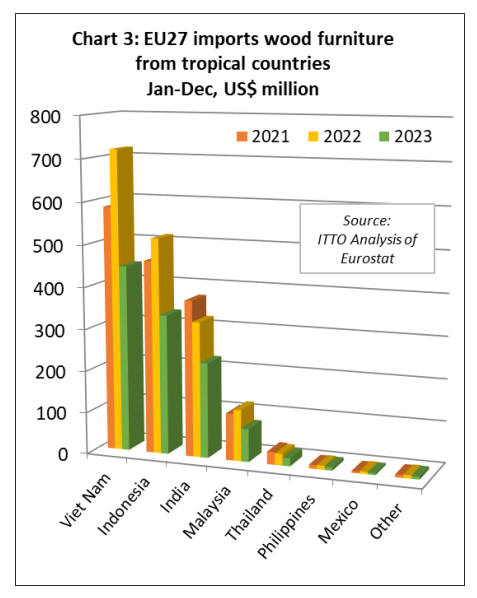
EU27 imports of tropical sawnwood declined 16% in
2023
The EU27 imported 848,000 cubic metres of tropical
sawnwood in 2023, 16% less than the previous year.
Import value of this commodity was US$782 million in
2023, 14% less than in 2022.
Imports declined from nearly all leading supply countries
including Cameroon (-9% to 328,600 cubic metres),
Gabon (-22% to 128,800 cubic metres), Brazil (-41% to
98,300 cubic metres), Malaysia (-20% to 68,700 cubic
metres), Ghana (-32% to 20,500 cubic metres), Côte
d’Ivoire (-27% to 14,100 cubic metres), DRC (-12% to
13,200 cubic metres), and Ecuador (-27% to 10,000 cubic
metres).
The only significant increases in tropical sawnwood
imports were from the Republic of Congo (+23% to
93,300 cubic metres) and CAR (+85% to 12,600 cubic
metres). The increase in sawnwood imports from the
Republic of Congo last year coincides with introduction of
a ban on log exports from the country on 1st January 2023
(Chart 4).
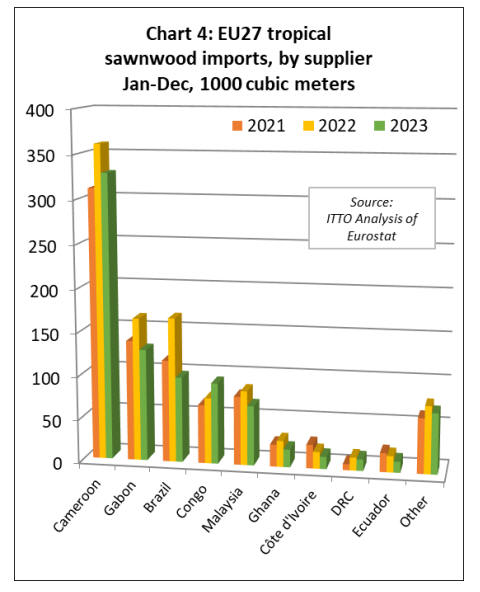
The EU27 imported 134,900 tonnes of tropical
mouldings/decking in 2023, 22% less than in the previous
year. Import value of tropical mouldings/decking was
down 35% to US$258 million in 2023.
Imports fell sharply from all the leading supply countries
including Brazil (-27% to 48,200 tonnes), Indonesia (-22%
to 40,900 tonnes), Gabon (-28% to 10,500 tonnes), Peru (-
15% to 10,400 tonnes), Malaysia (-16% to 6,300 tonnes),
and Bolivia (-29% to 5,600 tonnes) (Chart 5).
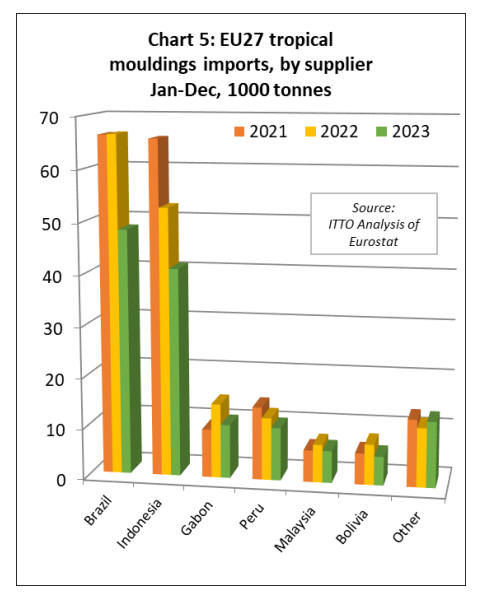
The EU27 imported 91,500 cubic metres of tropical logs
with a total value of US$58.3 million in 2023, respectively
23% and 10% less than in 2022.
The decline was universal across all supply countries
including the Republic of Congo (-8% to 44,700 cubic
metres), Central African Republic (-36% to 16,100 cubic
metres), Democratic Republic of Congo (-23% to 10,200
cubic metres), Cameroon (-12% to 9,700 cubic metres),
Liberia (-61% to 2,400 cubic metres), Guyana (-25% to
2,100 cubic metres) and Paraguay (-56% to 1,600 cubic
metres) (Chart 6).
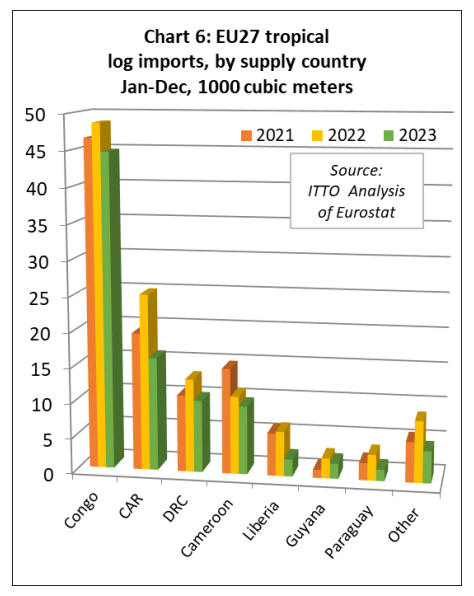
Reversal in EU27 imports of tropical hardwood veneer
in 2023
The EU27 imported 262,800 cubic metres of tropical
veneer with a total value of US$180 million in 2023, down
25% and 23% respectively compared to the previous year.
Imports of tropical veneer from Gabon, by far the largest
supplier to the EU27, decreased 22% to 133,800 cubic
metres in 2023. Imports of this commodity also declined
from Côte d'Ivoire (-35% to 55,900 cubic metres),
Cameroon (-10% to 36,100 cubic metres), Republic of
Congo (-39% to 10,300 cubic metres), Ghana (-30% to
6,000 cubic metres), and Equatorial Guinea (-41% to
4,700 cubic metres).
The only increase in tropical veneer imports into the EU27
last year was in indirect trade with the UK which was up
3% to 5,900 cubic metres (Chart 7).
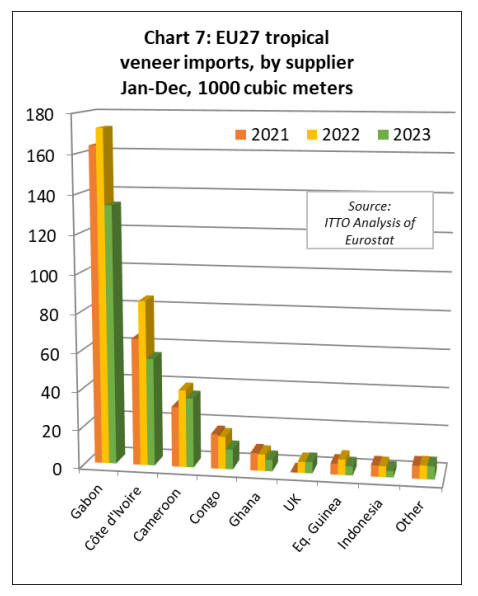
The EU27 imported 267,600 cubic metres of tropical
plywood with a total value of US$197 million in 2023,
respectively 10% and 24% less than the previous year.
Imports increased from China (+7% to 32,800 cubic
metres), Brazil (+9% to 15,400 cubic metres), and
Paraguay (+3% to 4,700 cubic metres), while indirect
imports via the UK were also up 15% to 10,100 cubic
metres.
However, imports from other tropical supply countries
declined including Indonesia (-5% to 87,500 cubic
metres), Gabon (-13% to 62,600 cubic metres), Morocco (-
31% to 14,900 cubic metres), Vietnam (-42% to 14,300
cubic metres), and India (-44% to 5,700 cubic metres)
(Chart 8).
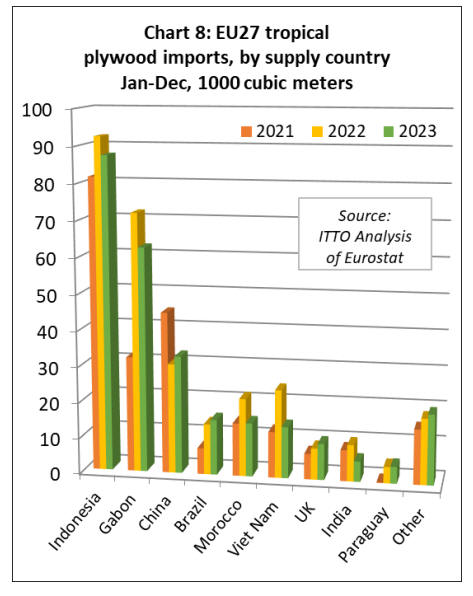
EU27 imports of tropical flooring decline 30% in 2023
The EU27 imported 19,900 tonnes of tropical wood
flooring with a total value of US$57 million in 2023, down
30% and 35% respectively compared to the previous year.
The consistent rise in EU27 wood flooring imports from
Malaysia, that began in 2020, stalled in 2023. Imports of
10,100 tonnes from Malaysia last year were 27% less than
in 2022. Imports also fell from Indonesia (-33% to 4,700
tonnes), Vietnam (-15% to 2,700 tonnes), and Brazil (-
63% to 900 tonnes) (Chart 9).
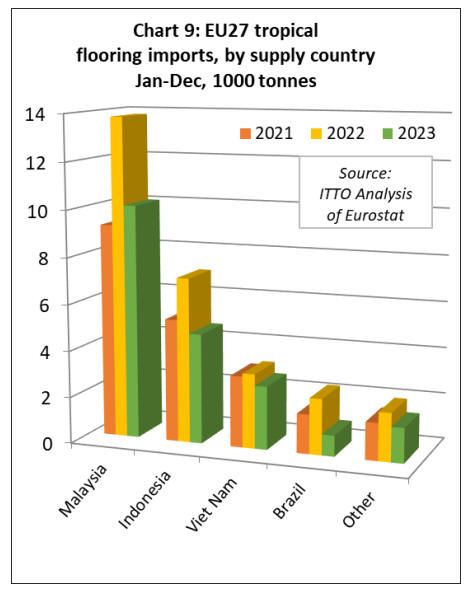
The value of EU27 imports of other joinery products from
tropical countries - which mainly comprise laminated
window scantlings, kitchen tops and wood doors –
declined 31% to US$198 million in 2023.
Import quantity fell 25% to 80,500 tonnes during the year.
Imports were down 39% to US$74 million from Indonesia,
down 25% to US$68 million from Malaysia, down 51% to
US$13 million from Vietnam, and down 74% to US$3
million from China.
In a potentially significant longer-term development, given
efforts in the country to shift up the value chain as log
exports are banned, EU imports of laminated joinery
products from the Republic of Congo were valued at
US$11 million in 2023, nearly three times the value of
2022 (Chart 10).
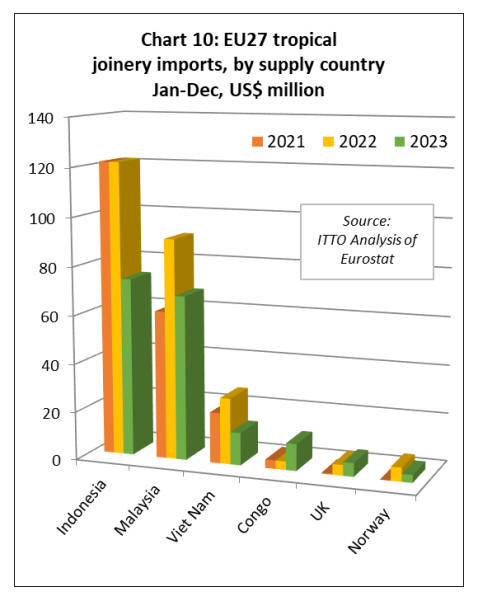
|